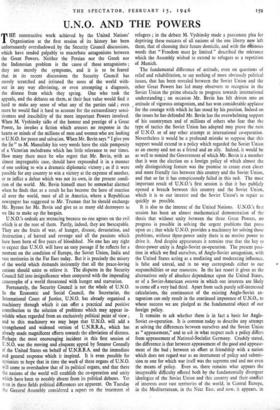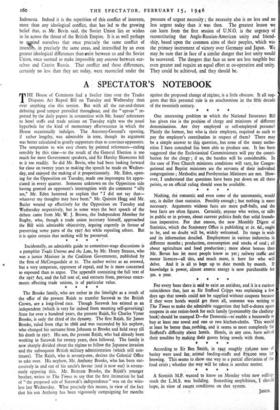U.N.O. AND THE POWERS
THE constructive work achieved by the United. Nations' 1 Organisation at the first session of its history has been unfortunately overshadowed_by the Security Council discussions, which have tended palpably to exacerbate antagonisms between the Great Powers. Neither the Persian nor the Greek nor the Indonesian problem is the cause of those antagonisms ; they are merely the symptoms, and it is to be feared that in its recent discussions the Security Council has merely scratched and irritated the sores of the world with- out in any way alleviating, or even attempting a diagnosis, the disease from which they spring. One who took the appeals, and the debates on them, at their face value would find it hard to make any sense of what any of the parties said ; even more he would find it hard to account for the extraordinary sensi- tiveness and irascibility of the more important Powers involved. When M. Vyshinsky talks of the honour and prestige of a Great Power, he invokes a fiction which arouses no response in the hearts or minds of the millions of men and women who are looking to U.N.O. for peace and salvation. When Mr. Bevin says " I give you the lid" to M. Manuilsky his very words have the stale pomposity of a Victorian melodrama which has 'little relevance to our times. How many there must be who regret that Mr. Bevin, with an almost impregnable case, shOuld have expounded it in a 'manner of one seeking to win a dramatic diplomatic victory ; as if it were possible for any country to win a victory at the expense of another, or to inflict a defeat which was not its own, in the present condi- tion of the world. Mr. Bevin himself must be somewhat alarmed when he finds that as a result he has become the hero of reaction all over the world, most of all in America, where a Republican newspaper has suggested to Mr:Truman that he should exchange Mr. Byrnes for Mr. Bevin and give us as many old destroyers as we like to make up the bargain.
U.N.O.'s ordeals are menacing because no one agrees on the evil which is at the root of them. Partly, indeed, they are Inescapable. They are the fruits of war, of hunger, disease, devastation, and destruction ; of hatred and revenge and all the passions which have been born of five years of blOodshed. No one has any right to expect that U.N.O. will have an easy passage if he reflects for a moment on the condition of Europe, the Soviet Union, India and vast territories in the Far East today. But it is precisely the misery of the world which demands insistently that all the peace-loving nations should unite to relieve it. The disputes in the Security Council fall into insignificance when compared with the impending catastrophe of a world threatened with hunger and starvation.
Fortunately, the Security Council is not the whole of U.N.O. In the Economic and Social Council, the Secretariat, the International Court of Justice, U.N.O. has already organised a machinery through which it can offer a practical and positive contribution to the solution of problems• which may appear in- soluble when regarded from an exclusively political point of view ; and to this machinery we may hope that U.N.O. will add a strengthened and widened version of U.N.R.R.A., which has already made magnificent efforts towards the alleviation of distress. Perhaps the most encouraging incident in this first session of U.N.O. was the moving and eloquent appeal by Senator Connally of the United States on behalf of U.N.R.R.A. and the immediate and general response which it inspired. It is even possible for Optimists to hope that in time the work of these organs of U.N.O. will come to overshadow that of its political organs, and that there the nations of the world will establish the co-operation and unity which have been so notably absent from its political debates. Yet even in these fields political differences are apparent. On Tuesday the General Assembly considered a report on the treatment of refugees ; in the debate M. Vyshinsky made a passionate plea for depriving these outcasts of all nations of the one liberty now left them, that of choosing their future domicile, and with the ominous words that "Freedom must lie limited" described the tolerance which the Assembly .wished to extend to refugees as a repetition of Munich.
The fundamental difference of attitude, even on questions of relief and rehabilitation, to say nothing of more obviously political issues, that has been revealed between the Soviet Union and the other Great Powers has led many observers to recognise in the Soviet Union the prime obstacle to progress towards international understanding ; on occasion Mr. Bevin has felt driven into an attitude of vigorous antagonism, and has won considerable applause for the courage with which he has stood by his position. Indeed on the issues he has defended Mr. Bevin has the overwhelming support of his countrymen and of millions of others who fear that the type of tactics the Soviet Union has adopted may prove the ruin of U.N.O. or of any other attempt at international co-operation. Nevertheless it would be a profound mistake to suppose that this support would extend to a policy which regarded the Soviet Union as an enemy and not as a' friend and an ally. Indeed, it would be as well to remind the Government of which Mr. Bevin is a member that it won the election on a foreign policy of which almost the only distinguishing feature was the promise to create even closer and more friendly ties between this country and the Soviet Union, and that so far it has conspicuously failed in this task. The most important result of U.N.O.'s first session is that it has publicly opened a breach between this country and the Soviet Union, which it is to our interest and the Soviet Union's to repair as quickly as possible.
It is also to the interest of the United Nations. U.N.O.'s first session has been an almost mathematical demonstration of the thesis that without unity between the three Great Powers, no progress is possible in solving the urgent problems that press upon us ; that while U.N.O. provides a machinery for solving those problems, without three-power unity there is no motive power to drive it. And despite appearances it remains true that the key to three-power unity is Anglo-Soviet co-operation. The present posi- tion in which we find ourselves, of Anglo-Soviet antagonism, with the United States acting as a mediating and moderating influence, is false and unreal, and in no way corresponds either to our responsibilities or our resources. In the last resort it gives us the alternatives only of absolute dependence upon the United States, or of a Soviet-American entente in which our interests are likely to come off a very bad third. Apart from such purely self-interested calculations, the continuance of the existing Anglo-Soviet an- tagonism can only result in the continued impotence of U.N.O., to whose success we are pledged as the fundamental object of our foreign policy.
It remains to ask whether there is in fact a basis for Anglo- Soviet co-operation. It is common today to describe any attempt at solving the differences between ourselves and the Soviet Union as "appeasement," and to ask in what respect such a policy differs from appeasement of National-Socialist Germany. Crudely stated, the difference is that between appeasement of the good and appease- ment of the bad ; between an effort at friendship with a nation which does not regard war as an instrument of policy and submis- sion to one for which war itself was the supreme end and not even the means of policy. Even so, there remains what appears the insuperable difficulty offered both by the fundamentally divergent ideologies of the Soviet Union and this country and their conflict of interests over vast territories of the world, in Central Europe, in the Mediterranean, in the Near East, and now, it appears, in Indonesia. Indeed it is the repetition of this conflict of interests, more than any ideological conflict, that has led to the growing belief that, as Mr. Bevin said, the Soviet Union lies or wishes to lie across the throat of the British Empire. It is as well perhaps to rwind ourselves that once precisely the same conflict of interMs, in precisely the same areas, and intensified by an even greater ideological differences than -exist between us and the Soviet Union, once seemed to make impossible any entente between our- selves and Czarist Russia. That conflict and those differences, certainly no less than they are today, were reconciled under the pressure of urgent necessity ; the necessity also is no less and no less urgent today than it was then. The greatest lesson we can learn from the first session of U.N.O. is the urgency of reconstituting that Anglo-Russian-American unity and friend- ship, based upon the common aims of their peoples, which was the primary instrument of victory over Germany and Japan. We may be sure that in face of a similar danger that lost unity would be recovered. The dangers that face us now are less tangible but even greater and require an equal effort at co-operation and unity. They could be achieved, and they should be.



























 Previous page
Previous page